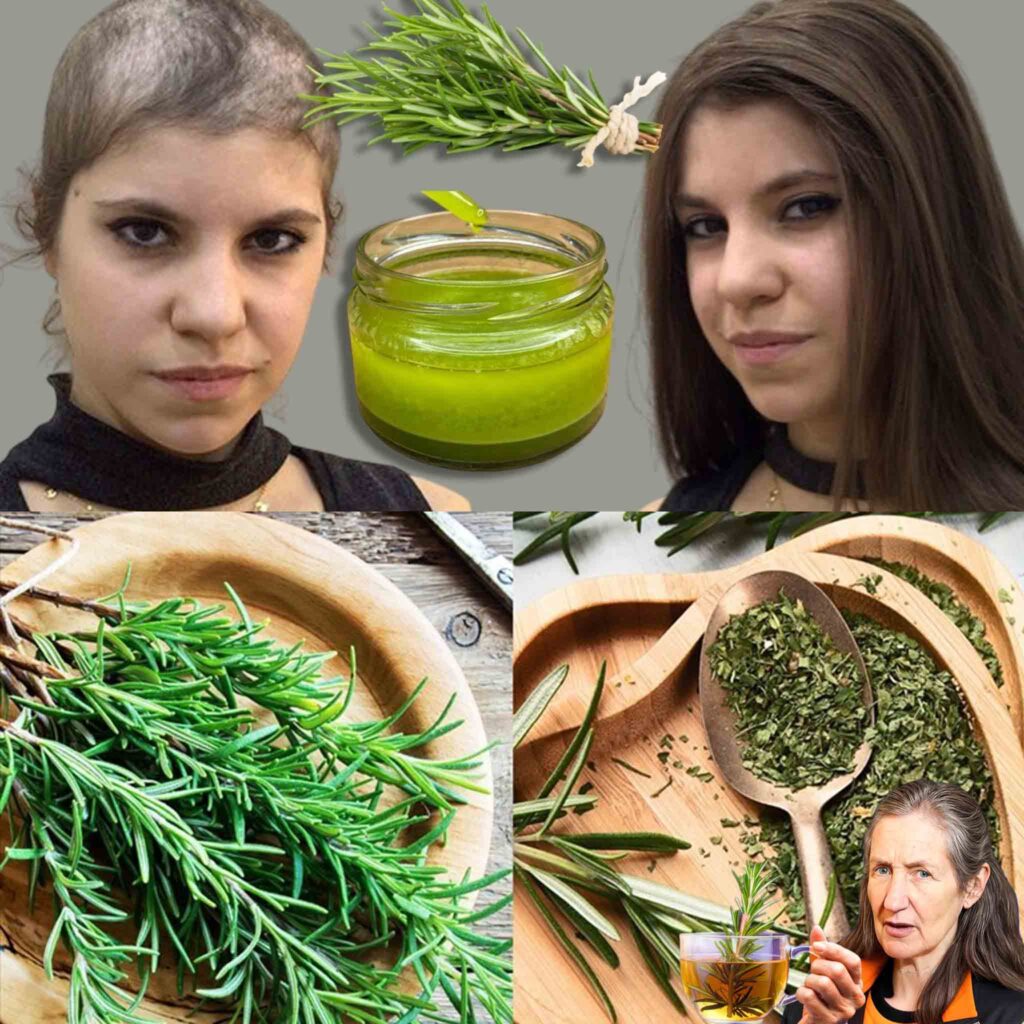If you’re struggling with hair thinning, slow growth, or even bald spots, adding rosemary to your shampoo might be the natural solution you’ve been searching for. Rosemary oil has been scientifically studied for its ability to stimulate hair follicles, improve scalp circulation, and even combat hair loss—comparable to minoxidil, a common hair regrowth treatment.
By incorporating rosemary essential oil into your hair care routine, you may experience stronger, healthier, and fuller hair over time. In this article, we’ll explore the benefits of rosemary for hair, step-by-step methods to use it in shampoo, and what results you can expect.

Why Use Rosemary for Hair Growth?
Rosemary is more than just a fragrant herb—it’s packed with hair-nourishing properties that can make a significant difference in your hair’s health. Here’s why rosemary is a game-changer for hair growth:’
✅ Stimulates Hair Follicles
Rosemary oil enhances blood circulation to the scalp, ensuring that hair follicles receive essential nutrients.
Increased blood flow rejuvenates dormant follicles, potentially promoting new hair growth.
✅ Prevents Hair Loss
Rosemary has been shown to prevent hair follicles from shrinking or dying off, which is a common cause of hair thinning and baldness.
Its natural compounds help block DHT, a hormone linked to hair loss in both men and women.
✅ Strengthens Hair from the Roots
Packed with antioxidants, rosemary protects the hair and reduces breakage.
It helps prevent split ends and weak, brittle hair, leading to thicker, healthier strands.
✅ Fights Dandruff & Scalp Irritation
Rosemary’s antifungal and antibacterial properties combat dandruff, itchiness, and scalp infections.
Regular use can lead to a healthier, flake-free scalp, which is essential for optimal hair growth.
How to Add Rosemary to Your Shampoo
There are several ways to infuse your shampoo with rosemary’s powerful benefits. Choose the method that works best for you!
1. Add Rosemary Essential Oil to Your Shampoo
This is the easiest and quickest method to integrate rosemary into your hair routine.
How to do it:
Add 5 drops of rosemary essential oil per ounce of shampoo (for example, if your shampoo bottle contains 8 ounces, add 40 drops).
Shake the bottle well to ensure the oil is evenly distributed.
Use as you normally would, massaging the shampoo into your scalp for at least 2 minutes before rinsing.
✔ Best for: Those looking for a hassle-free way to incorporate rosemary into their daily routine.
2. Make a Rosemary-Infused Shampoo
If you prefer a DIY approach, you can create your own herbal shampoo using fresh or dried rosemary.
How to make it:
Boil 1 cup of water and add 2 tablespoons of dried rosemary leaves (or 3-4 fresh sprigs).
Let it steep for several hours (or overnight for a stronger infusion).
Strain the rosemary water and mix it with your regular shampoo.
Shake well before each use.
✔ Best for: Those who prefer all-natural hair care without essential oils.
3. Apply Rosemary Oil as a Scalp Treatment
For a more intense hair growth boost, use rosemary oil directly on your scalp before washing your hair.
How to use it:
Mix a few drops of rosemary essential oil with a carrier oil (such as coconut oil, jojoba oil, or olive oil).
Massage the mixture into your scalp for 5-10 minutes.
Let it sit for at least 30 minutes (or leave it overnight for a deep treatment).
Wash with your rosemary-infused shampoo.
✔ Best for: Those experiencing significant hair loss or looking for maximum hair growth benefits.
What Results Can You Expect?
While results can vary based on hair type, genetics, and consistency, most people report visible improvements in hair thickness and strength within 2 to 6 weeks.
🔹 Week 2:
Hair feels softer and shinier.
Scalp feels refreshed, with less itching and dandruff.
🔹 Week 4:
You may notice less shedding during showers and while brushing.
Hair looks fuller and thicker at the roots.
🔹 Week 6 and Beyond:
New baby hairs may begin to sprout, especially in thinning areas.
Consistent use leads to stronger, healthier hair growth over time.
⏳ Important Note: Hair growth is a slow process, so patience and consistency are key! Use rosemary shampoo at least 3-4 times per week for the best results.
Precautions & Best Practices
⚠️ Do a Patch Test:
Before using rosemary oil, apply a small amount to your wrist or behind your ear to check for any allergic reactions.
⚠️ Avoid Direct Eye Contact:
Essential oils are highly concentrated—be careful when washing your hair to prevent irritation.
⚠️ Use a Carrier Oil for Direct Application:
Never apply undiluted rosemary essential oil directly to your scalp—it can cause irritation or dryness.
⚠️ Pair with a Healthy Lifestyle:
For faster and better results, maintain a nutrient-rich diet, stay hydrated, and minimize stress.
2. Make a Rosemary-Infused Shampoo
If you prefer a DIY approach, you can create your own herbal shampoo using fresh or dried rosemary.
How to make it:
Boil 1 cup of water and add 2 tablespoons of dried rosemary leaves (or 3-4 fresh sprigs).
Let it steep for several hours (or overnight for a stronger infusion).
Strain the rosemary water and mix it with your regular shampoo.
Shake well before each use.
✔ Best for: Those who prefer all-natural hair care without essential oils.
3. Apply Rosemary Oil as a Scalp Treatment
For a more intense hair growth boost, use rosemary oil directly on your scalp before washing your hair.
How to use it:
Mix a few drops of rosemary essential oil with a carrier oil (such as coconut oil, jojoba oil, or olive oil).
Massage the mixture into your scalp for 5-10 minutes.
Let it sit for at least 30 minutes (or leave it overnight for a deep treatment).
Wash with your rosemary-infused shampoo.
✔ Best for: Those experiencing significant hair loss or looking for maximum hair growth benefits.
What Results Can You Expect?
While results can vary based on hair type, genetics, and consistency, most people report visible improvements in hair thickness and strength within 2 to 6 weeks.
🔹 Week 2:
Hair feels softer and shinier.
Scalp feels refreshed, with less itching and dandruff.
🔹 Week 4:
You may notice less shedding during showers and while brushing.
Hair looks fuller and thicker at the roots.
🔹 Week 6 and Beyond:
New baby hairs may begin to sprout, especially in thinning areas.
Consistent use leads to stronger, healthier hair growth over time.
⏳ Important Note: Hair growth is a slow process, so patience and consistency are key! Use rosemary shampoo at least 3-4 times per week for the best results.
Precautions & Best Practices
⚠️ Do a Patch Test:
Before using rosemary oil, apply a small amount to your wrist or behind your ear to check for any allergic reactions.
⚠️ Avoid Direct Eye Contact:
Essential oils are highly concentrated—be careful when washing your hair to prevent irritation.
⚠️ Use a Carrier Oil for Direct Application:
Never apply undiluted rosemary essential oil directly to your scalp—it can cause irritation or dryness.
⚠️ Pair with a Healthy Lifestyle:
For faster and better results, maintain a nutrient-rich diet, stay hydrated, and minimize stress.
By incorporating rosemary essential oil into your hair care routine, you may experience stronger, healthier, and fuller hair over time. In this article, we’ll explore the benefits of rosemary for hair, step-by-step methods to use it in shampoo, and what results you can expect.

Why Use Rosemary for Hair Growth?
Rosemary is more than just a fragrant herb—it’s packed with hair-nourishing properties that can make a significant difference in your hair’s health. Here’s why rosemary is a game-changer for hair growth:
News
SHOCKING: Kanye West was suspended from Instagram immediately after making rude comments about Trevor Noah, South Africans were outraged when they learned the truth…/hi
Kanye West suspended from Instagram after slur against Trevor Noah This article is more than 2 years old West used racial slur after Noah criticised his behaviour…
BREAKING NEWS: Trevor Noah did this for Jordyn Taylor while she was struggling with the pain of a great loss../hi
Trevor Noah strolls with new model girlfriend Jordyn Taylor, as her heartbreak after her fiancé was killed in a freak car accident is revealed Smitten Trevor Noah…
BOILING POINT: Caitlin Clark and Rhyne Howard in Explosive Confrontation as Benches Nearly Clear in Fever vs. Dream Drama!
Caitlin Clark, Rhyne Howard exchange words during Fever’s heated win against Dream Caitlin Clark was involved in another heated exchange Getty Images Caitlin Clark had a frustrating night…
Angel Reese Managed To Set Women’s Basketball Back A Quarter Century With The Most Embarrassing 15 Seconds In WNBA History
Angel Reese Managed To Set Women’s Basketball Back A Quarter Century With The Most Embarrassing 15 Seconds In WNBA History Angel Reese (Photo via Twitter) Basketball fans…
Caitlin Clark’s Short Skirt Had Folks On Social Media Saying All Sorts Of Things Ahead Of The Fever’s Game vs. The Dream
Caitlin Clark’s Short Skirt Had Folks On Social Media Saying All Sorts Of Things Ahead Of The Fever’s Game vs. The Dream Caitlin Clark (Photos via Yahoo…
AFTER CAITLIN CLARK WAS FLOORED, SOPHIE CUNNINGHAM EXPLODES: ‘ENOUGH IS ENOUGH!’ – Sparks Outrage as She Calls Out WNBA Vets for ‘Targeted Attacks’ and a League That Turns a Blind Eye!
WATCH: Caitlin Clark Drops to the Floor in Disbelief After Sophie Cunningham’s Impressive Half-Court Shot The Indiana Fever have made it known that they are hunting for…
End of content
No more pages to load









